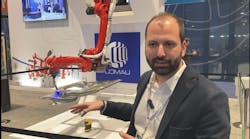Of course, the biggest reality show is our own lives and careers. This is unscripted reality, with real problems with very real solutions, except in the case of teenagers.
We as professionals give of ourselves to our passion and to a company that employs us, in order to better the world. That's the idea, anyway. Most of us are here because we want to be.
That's where the line blurs. Most of us really enjoy what we do. It's not about the money, as such. It's about the success of what we're doing. Our success becomes the company's success, and our customers' success.
Many define success by their bank accounts. I can tell you that you can be rich in many currencies. Emotional currency is a very valuable source of revenue. That account can be drained by co-workers, bosses, customers, and stuff that just doesn't work as advertised. When the account is close to empty, our abilities are taxed and our focus wanes, affecting the success of our adventure.
If the account doesn't get a deposit now and then, the recipient of that person's effort doesn't get the result they are looking for. This of course creates more account withdrawals.
So, who gives a rat's behind anyway? Just do your job and all will be fine.
Many studies contest that theory, though, and I've seen proof firsthand. The former maintenance manager at one of my customers was so focused on budgets (read as "my bonus") that the trades couldn't get the tools they needed, not even a warm jacket for outside work.
How much currency is in the collective accounts at this point? Though he might not have realized what he was doing, it brings me to the reason for this column.
The show is "Undercover Boss." A company's CEO goes out into his workforce under the guise of doing a documentary for some other company. I believe that things happen for a reason: This episode was on as I was working upstairs instead of downstairs, like I usually do.
The CEO of the Toronto Zoo was learning about cleaning bathrooms, feeding gorillas, educating kids, and genuinely finding out that the people who worked these so-called menial jobs really liked what they did.
One of the people the CEO worked with was a cancer survivor. Scripted? Probably, but the story was incredible. When we experience "man colds," we work through them because we care and working is part of our grain. But I bet we get paid a lot more than someone who feeds gorillas. The cancer survivor missed only the days that she had her chemo. No feet on the couch — she went to work because she likes what she does.
I find it astounding that a CEO of a company has to go into the field to realize that the employees are gold. Where was this employee's immediate manager to not have placed a deposit in her emotional account?
There was no acknowledgement of her struggle and her commitment whatsoever. I can't imagine that the ivory tower didn't know.
In another episode, the CEO found that the shipping department was using a busted laptop to print labels. It took more than five minutes to print paperwork. Where was the manager? It takes a CEO to see these things, and figure out what needs to be done? I would have fired the manager's butt.
Why are things just so tough? We have enough trouble getting the day in with all the expectations that we have. Remember Gus, the newly graduated engineer? His company told him he was moving into the manager's position in weeks. Nine months went by and no mention of this promotion. Who's minding the bank?
The cancer survivor summed it up very eloquently: "It's been over 20 years for someone to realize what I do. It's nice to know someone cares. My two most emotional things — work and my cancer—have now been acknowledged. Thank you."





